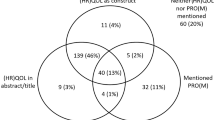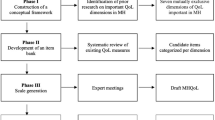Abstract
Purpose
Our aim was to investigate associations between the subjective burden of care and health-related quality of life (both physical and mental) within colorectal cancer patient carers in Ireland, with supplementary analysis of carer objective factors.
Methods
Two hundred twenty-eight colorectal cancer informal carers were sent a postal questionnaire between August 2010 and March 2011 which included the Caregiver Reaction Assessment (CRA) and the SF-12v2. Multiple regression analysis assessed whether five CRA domains (family support, finances, schedule, health and esteem) predicted carer mental or physical health. Between-group comparisons investigated differences in these domains across objective factors.
Results
One hundred fifty-three carers (82 % female) completed the questionnaire (response rate = 68 %). Carers’ mean physical component summary (PCS) was 48.56 (SD = 10.38) and mean mental component summary (MCS) was 49.22 (SD = 9.7). Five CRA factors explained 30 % of variance in the PCS score and 28 % of variance in the MCS score. Health burden (β = −.76, p < .001) and schedule burden (β = .28, p = .01) were significant predictors of PCS. MCS was significantly predicated by financial burden (β = −.24, p = .01) and esteem (β = −.18, p = .03). Younger carers, spouses, those with a comorbid condition and those with no income change had significantly lower PCS. There were no statistically significant group differences for carer mental health.
Conclusions
Our results demonstrate the need to recognise the distinctive aspects of the impact of caring (i.e., physical and mental) on carers and that different domains of subjective carer burden and objective factors impact differently on each of these. This has important implications for those delivering support to carers over the course of the survivorship continuum.
Similar content being viewed by others
References
Ferlay J, Steliarova-Foucher E, Lortet-Tieulent J, Rosso S, Coebergh JW, Comber H et al (2013) Cancer incidence and mortality patterns in Europe: estimates for 40 countries in 2012. Eur J Cancer 49:1374–1403
National Cancer Registry Ireland (2014) Cancer in Ireland 1994–2011: annual report of the National Cancer Registry.
De Angelis R, Sant M, Coleman MP, Francisci S, Baili P, Pierannunzio D et al (2014) Cancer survival in Europe 1999–2007 by country and age: results of EUROCARE–5—a population-based study. Lancet Oncol 15:23–34
Bray F, Ren JS, Masuyer E, Ferlay J (2013) Global estimates of cancer prevalence for 27 sites in the adult population in 2008. Int J Cancer 132:1133–1145
Olson RE (2012) Is cancer care dependant on informal carers? Aust Health Rev 36:254–257
Romito F, Goldzweig G, Cormio C, Hagedoorn M, Andersen BL (2013) Informal caregiving for cancer patients. Cancer 119(Suppl 11):2160–2169
van Ryn M, Sanders S, Kahn K, van Houtven C, Griffin JM, Martin M et al (2011) Objective burden, resources, and other stressors among informal cancer caregivers: a hidden quality issue? Psychooncology 20:44–52
Goren A, Gilloteau I, Lees M, DaCosta DM (2014) Quantifying the burden of informal caregiving for patients with cancer in Europe. Support Care Cancer 22:1637–1646
McMullen CK, Schneider J, Altschuler A, Grant M, Hornbrook MC, Liljestrand P et al (2014) Caregivers as healthcare managers: health management activities, needs, and caregiving relationships for colorectal cancer survivors with ostomies. Support Care Cancer 22:2401–2408
Kang J, Shin DW, Choi JE, Sanjo M, Yoon SJ, Kim HK et al (2013) Factors associated with positive consequences of serving as a family caregiver for a terminal cancer patient. Psychooncology 22:564–571
Arndt V, Merx H, Stegmaier C, Ziegler H, Brenner H (2004) Quality of life in patients with colorectal cancer 1 year after diagnosis compared with the general population: a population-based study. J Clin Oncol 22:4829–4836
Arndt V, Merx H, Stegmaier C, Ziegler H, Brenner H (2006) Restrictions in quality of life in colorectal cancer patients over three years after diagnosis: a population based study. Eur J Cancer 42:1848–1857
Jansen L, Koch L, Brenner H, Arndt V (2010) Quality of life among long-term (≥5 years) colorectal cancer survivors—systematic review. Eur J Cancer 46:2879–88
Cotrim H, Pereira G (2008) Impact of colorectal cancer on patient and family: implications for care. Eur J Oncol Nurs 12:217–226
Ohlsson-Nevo E, Andershed B, Nilsson U, Anderzen-Carlsson A (2012) Life is back to normal and yet not-partners’ and patient’s experiences of life of the first year after colorectal cancer surgery. J Clin Nurs 21:555–563
Sjovall K, Gunnars B, Olsson H, Thome B (2011) Experiences of living with advanced colorectal cancer from two perspectives—inside and outside. Eur J Oncol Nurs 15:390–397
Hanly P, Ceilleachair AO, Skally M, O'Leary E, Kapur K, Fitzpatrick P et al (2013) How much does it cost to care for survivors of colorectal cancer? Caregiver’s time, travel and out-of-pocket costs. Support Care Cancer 21:2583–2592
Siegel R, DeSantis C, Virgo K, Stein K, Mariotto A, Smith T et al (2012) Cancer treatment and survivorship statistics. CA Cancer J Clin 62:220–241
Kim Y, Kashy DA, Spillers RL, Evans TV (2010) Needs assessment of family caregivers of cancer survivors: 3 cohort comparisons. Psychooncology 19:573–582
Stenberg U, Ruland CM, Miaskowski C (2010) Review of the literature on the effects of caring for a patient with cancer. Psychooncology 19:1013–25
Taylor C (2008) Supporting the carers of individuals affected by colorectal cancer. Br J Nurs 17:226–230
Burridge LH, Barnett AG, Clavarino AM (2009) The impact of perceived stage of cancer on carers’ anxiety and depression during the patients’ final year of life. Psychooncology 18:615–623
Patterson JM, Rapley T, Carding PN, Wilson JA, McColl E (2013) Head and neck cancer and dysphagia; caring for carers. Psychooncology 22:1815–1820
Northouse LL, Katapodi MC, Schafenacker AM, Weiss D (2012) The impact of caregiving on the psychological well-being of family caregivers and cancer patients. Semin Oncol Nurs 28:236–245
Kim Y, Spillers RL (2010) Quality of life of family caregivers at 2 years after a relative’s cancer diagnosis. Psychooncology 19:431–440
Sjovall K, Attner B, Englund M, Lithman T, Noreen D, Gunnars B et al (2012) Sickness absence among cancer patients in the pre-diagnostic and the post-diagnostic phases of five common forms of cancer. Support Care Cancer 20:741–747
Ross A, Sundaramurthi T, Bevans MA (2013) Labor of love: the influence of cancer caregiving on health behaviors. Cancer Nurs 36:474–483
Ceilleachair AO, Costello L, Finn C, Timmons A, Fitzpatrick P, Kapur K, et al. (2012) Inter-relationships between the economic and emotional consequences of colorectal cancer for patients and their families: a qualitative study. BMC Gastroenterol; 12:62-230X-12-62.
Given CW, Given B, Stommel M, Collins C, King S, Franklin S (1992) The caregiver reaction assessment (CRA) for caregivers to persons with chronic physical and mental impairments. Res Nurs Health 15:271–283
Nijboer C, Triemstra M, Tempelaar R, Sanderman R, van den Bos GA (1999) Measuring both negative and positive reactions to giving care to cancer patients: psychometric qualities of the Caregiver Reaction Assessment (CRA). Soc Sci Med 48:1259–1269
van den Berg B, Spauwen P (2006) Measurement of informal care: an empirical study into the valid measurement of time spent on informal caregiving. Health Econ 15:447–460
Saris-Baglama RN, Dewey CJ, Chisholm GB, Plumb E, King J, Kosinski M, et al. (2007) QualityMetric Health Outcomes™ Scoring Software 3.0 User’s Guide.
Blake C, Codd MB, O'Meara YM (2000) The Short Form 36 (SF-36) Health Survey: normative data for the Irish population. Ir J Med Sci 169:195–200
Pallant J (2013). SPSS survival manual (5th ed.). McGraw Hill, New York.
Cohen JW (1988) Statistical power analysis for the behavioural sciences (2nd ed.). Lawrence Erlbaum Associates, Hillsdale, NJ.
Cohen JA (1992) Power primer. Psychol Bull 112:155–159
Bevans M, Sternberg EM (2012) Caregiving burden, stress, and health effects among family caregivers of adult cancer patients. JAMA 307:398–403
Papastavrou E, Charalambous A, Tsangari H (2009) Exploring the other side of cancer care: the informal caregiver. Eur J Oncol Nurs 13:128–136
Mehnert A, de Boer A, Feuerstein M (2013) Employment challenges for cancer survivors. Cancer 119(Suppl 11):2151–2159
Van Houtven CH, Ramsey SD, Hornbrook MC, Atienza AA, van Ryn M (2010) Economic burden for informal caregivers of lung and colorectal cancer patients. Oncologist 15:883–893
Longo CJ, Fitch M, Deber RB, Williams AP (2006) Financial and family burden associated with cancer treatment in Ontario, Canada. Support Care Cancer 14:1077–1085
Longo CJ, Deber R, Fitch M, Williams AP, D'Souza D (2007) An examination of cancer patients’ monthly ‘out-of-pocket’ costs in Ontario, Canada. Eur J Cancer Care (Engl) 16:500–507
Sharp L, Carsin AE, Timmons A (2013) Associations between cancer-related financial stress and strain and psychological well-being among individuals living with cancer. Psychooncology 22:745–755
Hanratty B, Holland P, Jacoby A, Whitehead M (2007) Financial stress and strain associated with terminal cancer—a review of the evidence. Palliat Med 21:595–607
Nijboer C, Triemstra M, Tempelaar R, Mulder M, Sanderman R, van den Bos GA (2000) Patterns of caregiver experiences among partners of cancer patients. Gerontologist 40:738–746
Chen SC, Tsai MC, Liu CL, Yu WP, Liao CT, Chang JT (2009) Support needs of patients with oral cancer and burden to their family caregivers. Cancer Nurs 32:473–481
Grov EK, Fossa SD, Sorebo O, Dahl AA (2006) Primary caregivers of cancer patients in the palliative phase: a path analysis of variables influencing their burden. Soc Sci Med 63:2429–2439
Park CH, Shin DW, Choi JY, Kang J, Baek YJ, Mo HN et al (2012) Determinants of the burden and positivity of family caregivers of terminally ill cancer patients in Korea. Psychooncology 21:282–290
Utne I, Miaskowski C, Paul SM, Rustoen T (2013) Association between hope and burden reported by family caregivers of patients with advanced cancer. Support Care Cancer 21:2527–2535
Schulz R, Beach SR (1999) Caregiving as a risk factor for mortality: the Caregiver Health Effects Study. JAMA 15:2215–9
Brouwer WB, van Exel NJ, van de Berg B, Dinant HJ, Koopmanschap MA, van den Bos GA (2004) Burden of caregiving: evidence of objective burden, subjective burden, and quality of life impacts on informal caregivers of patients with rheumatoid arthritis. Arthritis Rheum 51:570–577
Acknowledgments
Data collection was funded by the Health Research Board (SA/2004/1). We are grateful to the carers and colorectal cancer survivors who took part in the surveys, the clinicians and nurses who supported the fieldwork and Alan O’Ceilleachair who undertook the patient survey. We also thank the clerical support team at the National Cancer Registry who aided with survey administration and data input.
Conflicts of interest
Paul Hanly, Rebecca Maguire, Philip Hyland and Linda Sharp declare that they have no conflict of interest.
Author information
Authors and Affiliations
Corresponding author
Rights and permissions
About this article
Cite this article
Hanly, P., Maguire, R., Hyland, P. et al. Examining the role of subjective and objective burden in carer health-related quality of life: the case of colorectal cancer. Support Care Cancer 23, 1941–1949 (2015). https://doi.org/10.1007/s00520-014-2551-2
Received:
Accepted:
Published:
Issue Date:
DOI: https://doi.org/10.1007/s00520-014-2551-2




